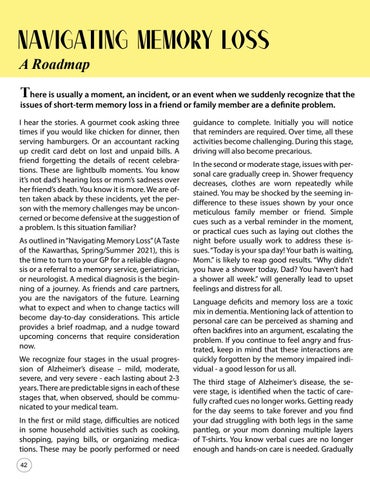NAVIGATING MEMORY LOSS A Roadmap There is usually a moment, an incident, or an event when we suddenly recognize that the issues of short-term memory loss in a friend or family member are a definite problem. I hear the stories. A gourmet cook asking three times if you would like chicken for dinner, then serving hamburgers. Or an accountant racking up credit card debt on lost and unpaid bills. A friend forgetting the details of recent celebrations. These are lightbulb moments. You know it’s not dad’s hearing loss or mom’s sadness over her friend’s death. You know it is more. We are often taken aback by these incidents, yet the person with the memory challenges may be unconcerned or become defensive at the suggestion of a problem. Is this situation familiar? As outlined in “Navigating Memory Loss” (A Taste of the Kawarthas, Spring/Summer 2021), this is the time to turn to your GP for a reliable diagnosis or a referral to a memory service, geriatrician, or neurologist. A medical diagnosis is the beginning of a journey. As friends and care partners, you are the navigators of the future. Learning what to expect and when to change tactics will become day-to-day considerations. This article provides a brief roadmap, and a nudge toward upcoming concerns that require consideration now. We recognize four stages in the usual progression of Alzheimer’s disease – mild, moderate, severe, and very severe - each lasting about 2-3 years. There are predictable signs in each of these stages that, when observed, should be communicated to your medical team. In the first or mild stage, difficulties are noticed in some household activities such as cooking, shopping, paying bills, or organizing medications. These may be poorly performed or need 42
guidance to complete. Initially you will notice that reminders are required. Over time, all these activities become challenging. During this stage, driving will also become precarious. In the second or moderate stage, issues with personal care gradually creep in. Shower frequency decreases, clothes are worn repeatedly while stained. You may be shocked by the seeming indifference to these issues shown by your once meticulous family member or friend. Simple cues such as a verbal reminder in the moment, or practical cues such as laying out clothes the night before usually work to address these issues. “Today is your spa day! Your bath is waiting, Mom.” is likely to reap good results. “Why didn’t you have a shower today, Dad? You haven’t had a shower all week.” will generally lead to upset feelings and distress for all. Language deficits and memory loss are a toxic mix in dementia. Mentioning lack of attention to personal care can be perceived as shaming and often backfires into an argument, escalating the problem. If you continue to feel angry and frustrated, keep in mind that these interactions are quickly forgotten by the memory impaired individual - a good lesson for us all. The third stage of Alzheimer’s disease, the severe stage, is identified when the tactic of carefully crafted cues no longer works. Getting ready for the day seems to take forever and you find your dad struggling with both legs in the same pantleg, or your mom donning multiple layers of T-shirts. You know verbal cues are no longer enough and hands-on care is needed. Gradually



















